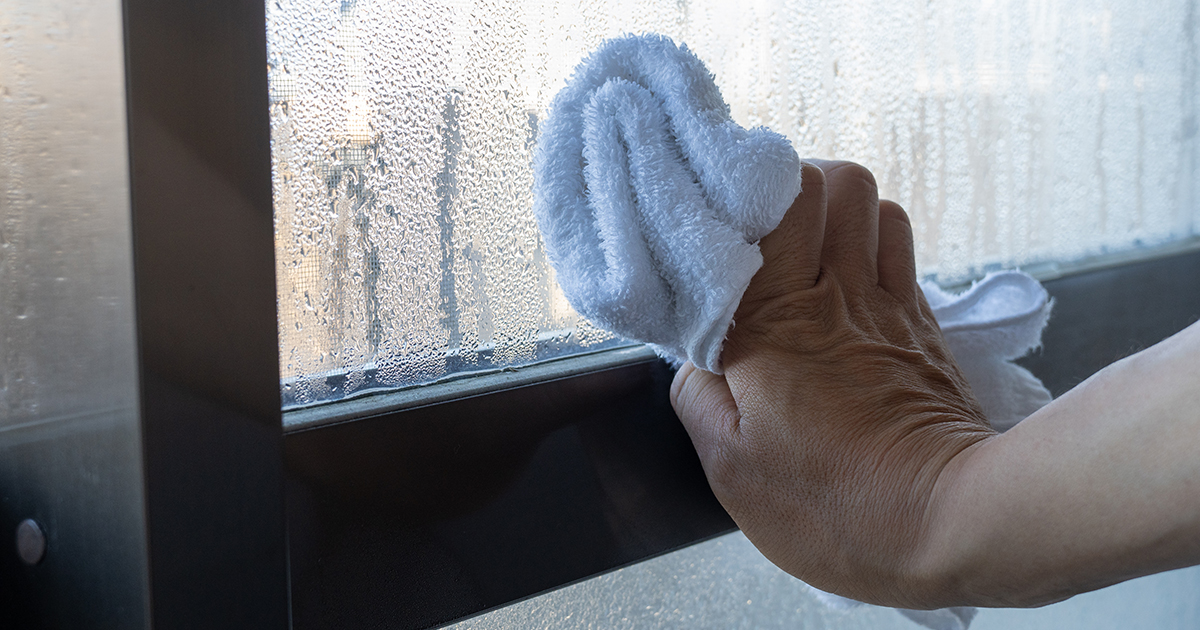Insights > Article > Posted: 2023-Nov-16, Updated: 2025-Mar-21
Replace, or Repair?
Fogged Window Panes

Signs of a failed gas seal include condensation or fogging between panes, stains that won’t clean, and a colder feel in winter. In Ottawa’s extreme climate, these issues can worsen, with increased heat entering in summer and cold drafts in winter, leading to higher energy costs and declining window performance.
What is an IGU?
An Insulated Glass Unit (IGU) is a window system made up of two or more panes of glass separated by a spacer and sealed to create an airspace. This airspace is often filled with insulating gases like argon or krypton, which enhance the window’s energy efficiency by reducing heat transfer. IGUs are designed to maintain a stable internal environment by preventing moisture and air from entering between the panes. When the seals fail, the gas can escape, and moisture can enter, leading to reduced insulation and visible issues like fogging or stains.
Has the seal really gone?
Question: Why do I sometimes notice fogging in between the windows panes and other times not? If the seal is gone, why does the fogging keep disappearing?
Answer: When the seal between window panes is compromised, moisture enters the space between the panes, leading to fogging. However, the fogging doesn’t always stay visible because it depends on the surrounding temperature and humidity. On colder or more humid days, the trapped moisture condenses and becomes visible as fog. When the weather is warmer or drier, the moisture may evaporate or be less visible, giving the impression that the fogging has disappeared. Even though the fog comes and goes, the seal is still broken, and the window’s insulating properties are diminished.
Question: Sometimes I see moisture on the outside surface of the glass both inside and outside the home. Does that mean the seal has gone?
Answer: Not necessarily. Moisture on the outside surface of the glass is often due to temperature and humidity differences, not a failed seal. In colder months, it results from condensation caused by warm indoor air or cool outdoor air. In fall, spring, and summer, it can appear due to variations in outdoor temperature and humidity. If moisture is trapped between the panes, it could indicate a failed seal. A professional can help determine if the seal is compromised.
Question: Why do I sometimes see moisture on the outside of my multi-glazed windows and other times on the inside? This seems to change with the seasons. Does it mean the window seal is broken?
Answer:
Scenario 1 - Cooler Months:
Exterior Condensation (glass surface outside the home):
This is typically a sign that your windows are performing well. Modern, energy-efficient windows with insulated glass can prevent indoor heat from escaping. As a result, the exterior surface may be cooler than the outside air, causing condensation when the outdoor humidity is high. It’s similar to how dew forms on grass in the morning and doesn't indicate a seal failure.
So, even though the outdoor air may be cold, the insulating properties and heat retention of your windows can cause the exterior glass surface to be cooler, leading to condensation when the outdoor humidity is high.
Scenario 2 - Summer:
Exterior Condensation (glass surface outside the home):
During warmer months, when the outdoor air is hot and humid, condensation can form on the outside surface of your windows if the glass is cool from indoor air conditioning. This is especially noticeable in the morning or evening when humidity levels are high. This type of exterior condensation is a sign that your windows are insulating well, as the cool indoor air isn’t escaping. It does not indicate a broken seal.
Scenario 3 - Winter:
Interior Condensation (glass surface inside the home):
During colder months, when indoor air is warm and humid, moisture can condense on the inside surface of windows if the indoor humidity level is too high. This is common in bathrooms, kitchens, or areas with poor ventilation. It usually indicates a need for better humidity control in your home, not a seal problem.
Scenario 4 - Any Season:
Moisture Between the Panes:
If you notice condensation between the glass panes, regardless of the season, it’s likely a sign of a failed window seal. This happens because the insulating gas has escaped, allowing moisture to infiltrate between the panes. This issue requires attention, as the window’s insulating properties have been compromised.
How regassing and resealing works
The process involves refilling the IGU with insulating gas, typically argon or krypton, and repairing or replacing the seals. This may seem like a quick fix for fogged-up windows or reduced insulation, but it’s not a permanent solution.
Short-term savings
One clear advantage of regassing and resealing is cost. It’s usually cheaper than replacing the entire IGU, and for homeowners on a budget, it can seem like a reasonable option. Additionally, it may have environmental appeal, as it avoids the waste associated with discarding the whole unit.
The reality of durability
However, the longevity of regassed and resealed IGUs is limited. While new IGUs are built in controlled factory environments, regassing and resealing is done in the field, where it’s impossible to replicate the original sealing conditions. As a result, most resealed IGUs only last 3 to 5 years before the seals fail again. In contrast, a new factory-sealed IGU can last 15 to 20 years or more.
Seal integrity is another concern. The repaired seals are often not as strong as the original, leading to recurring issues. Even with the regassing, small leaks are likely to develop, reducing the insulating efficiency of the window. The result is a window that may fog up again or lose its insulating properties more quickly than expected.
Stains and condensation issues
One major downside of seal failure is moisture entering the space between the panes, causing stains, fogging, or mineral deposits. Regassing and resealing does not fix these issues. Once dirt or moisture has penetrated the IGU, the stains cannot be cleaned without dismantling the unit. In these cases, replacement is the only way to restore the clear appearance of the window.
A temporary fix
While regassing and resealing may be a viable short-term solution for those looking to delay full replacement, it’s important to understand that it’s not a long-lasting fix. For older windows or IGUs with severe seal failure, replacing the entire unit is the most effective option, offering better insulation, a clearer view, and more durability.
Conclusion
Regassing and resealing might save you money upfront, but it’s a temporary fix at best. The durability is limited, and it won’t address deeper issues like moisture buildup or stains inside the panes.
Related articles
Struggling with IGU Performance?
At Bayview Windows, we focus on providing you with the best long-term solutions. While we don’t offer gas resealing, we strongly recommend replacing your IGU to ensure superior energy efficiency, performance, and peace of mind. If you need help assessing your situation, don’t hesitate to reach out to us today. We’re here to guide you every step of the way.
25 Best Value Tips
Free E-Book
Choosing the Right Look
Window Security
Custom Windows
Window Styles
Window Types
You've Got Options
Reducing Outside Noise
E-BOOK GUIDE
Best Replacement Windows
INFOGRAPHIC
INFOGRAPHIC
Fogged Window Panes
Signs & Considerations
Builders vs Premium Grade
Full-Frame vs Pocket
Basement Windows
The Art of Window Shopping
Top Considerations
Custom Window Shapes
INFOGRAPHIC
Right For Your Home
Single-Glaze vs Multi-Glaze
INFOGRAPHIC
Window Interior
Window Exterior
Choosing a Material
Window Grills
Operational Windows
The Colour Process
Weatherstripping
Window Jambs
Window Flashing
Window Spacers
Trim, Capping, Cladding...
Self-Cleaning Windows
Sash vs No Sash Windows
Bay and Bow Windows
Slider Configurations
Slider Pros & Cons
Awning Pros & Cons
Casement Pros & Cons
Hung Pros & Cons
Window Energy Efficiency
The basics
30 Common Myths
Do's and Don'ts
Winter Screen Protection



